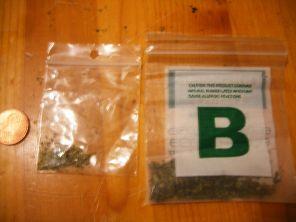Latest
Ecstasy Effective As PTSD Treatment
Large pot farms on verge of approval in Oakland
Brazil's Drug Problem Shaping Foreign Policy

DARE Attacks Marijuana Legalization While Praising Alcohol
[image:1 align:left caption:true]Skip Miller is the chairman of DARE America and, as you might guess, he's terrified of what could happen if marijuana becomes legal:
Do we really want to make it easier to get stoned?
Cut through the smoke and that's really what California voters will be deciding in November with Proposition 19, which would make this the only state to fully legalize marijuana — a drug with proven negative health consequences.
…
The concern with marijuana is not based on my personal disapproval or bias but upon what science tells us about the drug's effects. The science is clear: Marijuana is associated with physical and mental illness, poor motor performance and cognitive impairment. [San Jose Mercury News]
So according to Skip Miller, science compels us to keep marijuana illegal. Yet, as SAFER points out, his website takes a very different tone when it comes to alcohol:
Take a minute and think how often adults drink alcohol: a cold beer at a baseball game, a glass of Chardonnay with a piece of broiled fish, a gin and tonic on a warm day. Social drinking is an acceptable and pleasurable activity for millions of Americans. It relaxes you, curbs stress, and chases away inhibitions… [DARE.org]
Wait, what!? Although the statement goes on to acknowledge the problems associated with alcohol abuse, there's no question that DARE is going out of its way to defend recreational drinking. And I agree with every word. Teaching young people that there's nothing wrong with responsible drinking is important, even though I find it ridiculously weird that DARE, of all places, would seek to do that.
All of this just serves to highlight the mind-blowing prejudice and hypocrisy that underscores DARE's position on marijuana policy. If alcohol can be enjoyed responsibly by millions of adults, despite all the mayhem associated with it, then of course the same must be true of marijuana. On the other hand, if the potential for negative outcomes trumps the rights of responsible users, then why on earth is DARE applauding "acceptable and pleasurable" alcohol instead of insisting that science compels us to start arresting people for possessing it?
When pressed, the architects of this brainless disparity typically resort to some desperate nonsense about alcohol being accepted and familiar in our culture, as though marijuana just arrived on a boat sometime last year. These same idiots actually are the last remaining obstacle to broader social and legal acceptance of marijuana, and if only we could take away their precious beer, we'd find them at the bargaining table within 48 hours.
Marijuana Church Founder "Too Dangerous" For Bail
Oregon Medical Marijuana Dispensary Initiative Makes Ballot
Experts turn against war on drugs
'War on drugs' fuels HIV epidemic as governments ignore science, experts say
Mexico Drug War Update
San Diego Pot Trial Could Be National Test Case
Oklahoma Rep. Randy Terrill discussed taking drug fund money months ago, records show
Law seeks to curb overdose deaths
This Week in History
Chronicle Reviews: Two Books on Mexican Drug War, One on Border
California Marijuana Legalization Initiative Picks Up Big Labor Endorsement
Plan Colombia: Ten Years Later
RAND's Research on Marijuana Legalization is Questionable
Confusion abounds following last week's release of a RAND study on the ramifications of legal marijuana in California. In particular, RAND's discussion of rock-bottom prices has growers panicking and the suggestion that use could increase dramatically has opponents chomping at the bit. But, as Pete Guither helpfully explains, the whole thing is just a bunch of wild speculation.
Just look what passes for scientific analysis at RAND when it comes to marijuana legalization:
However, a simple calculation suggests that, if someone believes that marijuana is causally responsible for many crashes that involve marijuana using drivers, legalization’s effect on crashes could be a first-order concern for them. [...]
There is no empirical evidence concerning an elasticity of fatal accident rates with respect to marijuana price, prevalence, or quantity consumed, and, as we have underscored repeatedly, there is enormous uncertainty concerning how legalization might affect those outcomes.
However, 50- or 100-percent increases in use cannot be ruled out; nor can the possibility that marijuana-involved traffic crashes would increase proportionally with use. So it would be hard to dismiss out of hand worries that marijuana legalization could increase traffic fatalities by at least 60 per year…
Nor can we entirely rule out the possibility that legalizing marijuana could somehow cause the earth to stop spinning on its axis, resulting in the incineration of a hundred nations, while others are left buried beneath sheets of ice.
I'm exaggerating, but the point is that when RAND says legalization might double marijuana use and lower the ounce price to $38, they're just babbling because the media is stupid enough to listen. Even RAND admits that their analysis is subject to so many intangible variables as to render futile any effort to quantify legalization's practical impact. The problem is that they went ahead and proceeded to announce various arbitrary computations that sound provocative and mean absolutely nothing.
So, for what it's worth, let's just establish a couple principles that might help sort out some of the confusion here:
1. Marijuana will never cost $38 per ounce in California as long as it remains illegal everywhere else and sells for up to $500. Prop 215 didn't reduce prices by 80% and neither will Prop 19.
2. Marijuana is already way too available in California for any policy change to dramatically impact rates of use. No one is sitting around in Los Angeles waiting for legalization so that they can find a way to buy some weed.
3. If marijuana were a significant cause of traffic fatalities, California's highways would already be stained with blood. See point #2.
Update: Dave Borden has convinced me that I've been at least somewhat unfair to RAND, insofar as a big part of my frustration here results from the way the media presented the research. It's true that the study's authors were careful to explain that there remains considerable uncertainty about the practical impact of legalization. There are issues that I think could have been handled much better, but I wouldn't want to set a standard that prohibits inquiry, simply because so much remains unclear.
Vienna Declaration Update: Number of endorsements
Dear friends,
Thank you for endorsing the Vienna Declaration. Joining your ranks are over 5000 individuals, among them ex-presidents, Nobel Laureates, literary icons, police officers, current and former drug users and many, many others who believe drug policy should be based on evidence, not ideology.
This Saturday, to celebrate our success so far, the President of the International AIDS society (IAS) will be releasing the exact number of declaration endorsements at the opening of the International AIDS Conference, the largest public health conference on the planet. To help the IAS President make it clear that illicit drug policies causing disease, violence, and crime will not be tolerated by the international community we're asking each signatory to bring on four more endorsements.
Will you help us?
There are three easy ways you can encourage your friends to sign the Vienna Declaration online, right now:
1. Email them. Send them a pre-written email with our easy-to-use Tell-A-Friend tool or share this shortened link to our site: http://bit.ly/signtheviennadeclaration.
2. Facebook and Twitter. Invite your friends to fan us on Facebook or follow us on Twitter to get daily updates and learn more about why they should sign the Declaration.
3. Blog or post a link. Visit the media section of our site for all the information you need to blog about the Vienna declaration. You can also email us at [email protected] if you would like a badge to post to your site.
Every endorsement counts so please, continue spreading the word and help us make this Saturday's announcement a powerful one.
Thank you for your continued support,
The Vienna Declaration Team![]()
![]()
![]()
Second Chance Conference Website Released
Â
Â
|
Pagination
- First page
- Previous page
- …
- 421
- 422
- 423
- 424
- 425
- …
- Next page
- Last page

